Treesong's Blog: Treesong on Goodreads, page 12
October 4, 2015
Book Review: The Windup Girl by Paolo Bacigalupi
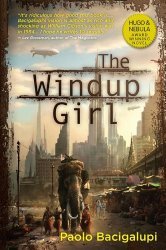
This novel works so well on so many levels. I found the surreal post-apocalyptic setting and the colorful cast of character compelling from the very beginning. As the story progressed, it became clear to me just how fascinating, complex, and meaningful this story is. The technology, ecology, economy, culture, and characters all intersect and interact to create plots and character development that possess a rare combination of both depth and urgency. If I had more spare time, I would have been tempted to read the entire novel in a single sitting. I'm glad I didn't, though, because there is too much good material here to digest in a single sitting. Fully appreciating the setting, the characters, and the meaning behind it all takes time -- but it's well worth the effort.
The story explores some of the extremely negative potential outcomes of bioengineering. Proponents of bioengineering might very well have a knee-jerk reaction, assuming that the entire novel is just a fear-based screed against the dangers of bioengineering. However, Bacigalupi's exploration of the topic is surprisingly nuanced and introspective. Yes, there are horrors -- an endless parade of corporate-engineered plagues, bizarre bioengineered creatures, and so on. But there are also curiosities and wonders. The author's presentation of bioengineered horrors is not so much a critique of biengineering itself as it is a critique of the individuals and corporations that would apply the technology of life to the ruthless pursuit of profit and power.
The exploration of human-caused global warming is a less central focus of the novel, yet still a major thread in the weaving of this complex narrative. As an author with an emphasis on climate fiction, human-caused global warming tends to be at the center of the plot of many of my stories. Bacialupi, however, chooses to incorporate it as prominent part of the setting rather than making it the driving force behind the advancement of the plot. This story takes place in a world that is suffering from the consequences of global warming and the end of the fossil fuels era. Simply presenting this as a fact of the setting rather than making it a turning point of the plot actually places a quiet but powerful emphasis on his presentation of the future realities of global warming. It's just a given; in the future, no one is contesting the existence or effects of global warming. It's just a reality that everyone has to deal with, reflected in many aspects of their society -- from transportation to energy sources and beyond.
The Windup Girl also features several explorations of how race and ethnicity impact identity and basic survival in times of upheaval. As a person of European ancestry living in the United States, it was very interesting (and illuminating!) for me to see the pale-skinned, blue-eyed "farang" (white) characters portrayed as foreign and dangerous. That may sound offensive to some people, but I actually found it to be quite appropriate and a very well-written aspect of the plot and character development. It was also interesting to see the relationships between the native Thais, the Malaysian Chinese, the Japanese, and the bioengineered "windups" or "New People".
There are some books -- especially in the realm of speculative fiction -- that I would only recommend to certain audiences. Zombie fiction is for zombie fans; romance novels are for romance fans; and so on. The Windup Girl, however, is a novel that I would recommend to everyone alive today in the early twenty-first century. Some of the technological elements and drastic changes that have taken place in society will seem strange to readers who don't usually read speculative fiction. However, the importance of the themes explored -- and the artful and compelling way in which they are explore -- makes this novel a worthwhile read for everyone who cares about the future of life on this planet!
September 19, 2015
Book Review: The Dispossessed by Ursula K. Le Guin
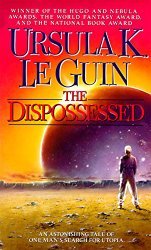
The basic premise is fairly simple. The Tau Ceti star system is home to two twin planets, Urras and Anarres. Urras is a verdant, hospitable world that has been inhabited by humanoid life for millennia. Anarres, on the other hand, is a sparsely populated desert world that was settled two hundred years ago by revolutionary anarchists. Aside from a single freighter that periodically makes the trip, the two worlds — archist Urras and anarchist Anarres — are completely isolated from each other. The story starts with the first person traveling from Anarres to Urras since the revolution that lead to the settlement of Anarres.
What makes The Dispossessed a remarkable work of literature is the ease with which it explores a wide range of fascinating and important themes and topics through the lens of a compelling plot and cast of characters. Many books have one or more of these elements — compelling characters, compelling plot, interesting political ideas, interesting scientific ideas, interesting philosophical ideas, etc. The Dispossessed combines all of the above into an impressively cohesive and compelling narrative.
The main obvious theme is the role of government in human societies. The simplest explanation of the plot is that it’s a utopian tale exploring what it would be like if an anarchist (specifically anarcho-syndicalist) society had an entire world on which to develop its own social institutions and culture. This is contrasted with the realities of the archist (a.k.a. statist) world. Urras is dominated by two nation-states — the capitalist (“propertarian”) A-Io and the communist Thu. These two nation-states are drawn into a proxy war that serves as a fairly transparent (but creatively executed) analogy for the real-world conflict in Vietnam and the Cold War generally.
There are, however, many additional nuances to the setting and story that go beyond the role of government. Gender, sex, and sexuality are explored at some length, contrasting the patriarchy and possessive of A-Io with the gender equality and sexual liberation of Anarres. Physics and philosophy are also discussed at great length because the main character, Shevek, is a theoretical physicist and philosopher who is searching for a unified theory of time and space similar to the one that real-world physicists are searching for.
Part of what makes The Dispossessed such an exceptional novel is its utopian realism. The dichotomy between Urras and Anarres initially seems quite simple — the dystopian “propertarians” versus the utopian anarchists. As the novel progresses, however, the narrative explores the strengths and weaknesses of both worlds in a complex and realistic manner. Anarres clearly has the more liberatory society, but its emphasis on mutual aid ironically leads to an overemphasis on social approval and acceptance which can discourage innovation and independent thinking. Urras is clearly a troubled propertarian society, but their world has so much more material wealth and abundance of living creatures. Shevek has many interesting and rewarding experiences on Urras, even though A-Io’s institutions and culture are ultimately contrary to his values.
The Dispossessed offers an exciting exploration of life’s nature and purpose. The depth and thoughtfulness of this exploration is rare both in fiction and reality. It’s an exciting (and at times harrowing) journey through many questions about life, love, the world, the cosmos, and everything in between. I highly recommend this book to anyone and everyone. I’m also glad to see that others have already developed curricula related to The Dispossessed. This is a book that should be taught in literature, philosophy, and other classes right along with other great classics of utopian and dystopian fiction.
For this and other reviews by Treesong, visit treesong.org.
August 19, 2015
Summer Cli-Fi Sale
I’m pleased to announce that I’m having a summer sale on climate fiction (cli-fi). My two novels, Change and Goodbye Miami, are on sale on Amazon for just 99 cents from August 19 through August 26. My short story collection, Strange Beginnings, is also available for free on Amazon from August 18 through August 22.
 In Change, Sarah Athraigh, an environmental activist from Southern Illinois, stumbles into the midst of a hidden war between occult factions that are grappling with the root causes and dire consequences of climate change. As she goes on the run, she soon finds herself on a journey of discovery, searching for the unusual allies and innovative ideas that will help her to make a difference for the better in a dangerous world.
In Change, Sarah Athraigh, an environmental activist from Southern Illinois, stumbles into the midst of a hidden war between occult factions that are grappling with the root causes and dire consequences of climate change. As she goes on the run, she soon finds herself on a journey of discovery, searching for the unusual allies and innovative ideas that will help her to make a difference for the better in a dangerous world.Buy Change on Amazon: http://smile.amazon.com/Change-ebook/...
 In Goodbye Miami, Kass, an American climate refugee, flees Miami in the wake of a hurricane that leaves most of the city underwater. After moving in with her cousin in Southern Illinois, Kass struggles to deal with her displacement. She hopes to find a way to return to the city that she loves. But thanks to global warming, that city is now underwater. What starts as a search for survival quickly evolves into a struggle for the future of Miami — and the world.
In Goodbye Miami, Kass, an American climate refugee, flees Miami in the wake of a hurricane that leaves most of the city underwater. After moving in with her cousin in Southern Illinois, Kass struggles to deal with her displacement. She hopes to find a way to return to the city that she loves. But thanks to global warming, that city is now underwater. What starts as a search for survival quickly evolves into a struggle for the future of Miami — and the world.Buy Goodbye Miami on Amazon: http://smile.amazon.com/Goodbye-Miami...
 Strange Beginnings is a collection of short stories by yours truly. These tales all take place in the same setting as my cli-fi novel, Change, and all relate in some way to the theme of strange beginnings — and often strange endings.
Strange Beginnings is a collection of short stories by yours truly. These tales all take place in the same setting as my cli-fi novel, Change, and all relate in some way to the theme of strange beginnings — and often strange endings.Download Strange Beginnings for FREE on Amazon: http://smile.amazon.com/dp/B00K7B9SSC
Climate fiction, also known as cli-fi, is a newly emerging genre of fiction. Cli-fi stories explore the role of the climate and human-caused climate change in our lives. They range in tone from post-apocalyptic tales of survival to present-day tales of activism and advocacy for climate justice. In addition to providing quality entertainment, cli-fi stories also provide a unique opportunity to reflect on the real-world climate crisis and our responses to it. Cli-fi authors use the ancient art of storytelling to explore global warming and related issues in a way that goes beyond what any charts or graphs can offer. Compelling characters and exciting plots draw the reader in and may inspire them to feel more personally invested in responding to the real-world climate crisis.
In related news, I’m currently working on two other cli-fi books: a sequel to Change called Order and a short story collection with the working title Cli-Fi Plus. I’ve also recently started work on my first superhero-themed novel. To receive the latest updates on my writing and superhero adventures, please sign up for my newsletter. Also, please share this post with anyone you know who may be interested cli-fi. Thanks!
This post originally appeared on my blog.
July 19, 2015
My Newsletter
Treesong's Newsletter
This is a rather low-traffic email newsletter with only about 1-2 emails per month. Sign up today and you'll receive a free short story selected at random from a pool of stories currently awaiting publication.
Do you have any ideas for future editions of this newsletter? Let me know and I'll consider them. In the meantime, thanks for reading!
January 6, 2015
Recent Climate Fiction And Nonfiction
I often find myself at a loss for what to do about the climate crisis. Climate science indicates that we're cooking the planet. Human civilization as we know it will probably end soon if we continue with our current course of action. So far, nothing seems sufficient to change our course. So what am I going to do about it? I'm going to review some books about the climate!
Here are a few quick reviews of some of the climate fiction and nonfiction books I've read in the past several months. I may do longer reviews later if there is sufficient interest. In the meantime, I wanted to write up at least a few short review in the hopes that you will be inspired to read some of these books too. I don't have all of the answers, but I know that informing ourselves and exploring where our choices may take us can only help. The following stories vary in their degree of realism, contributions to the discourse, etc., but they all contribute something meaningful.
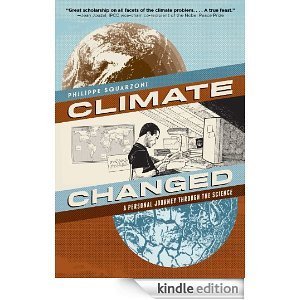 Climate Changed: This is an amazing book. This non-fiction graphic novel explores the author's personal journey as he learns about the science behind global warming. Even if you don't find his personal story or artistic flourishes compelling, this book is worth a read for the remarkably informative and moving exploration of the basic science and its implications for our present and future. This is essential material presented in a textually engaging and visually stimulating format. Basically, if you live on Planet Earth in the early 21st century, you should read this book!
Climate Changed: This is an amazing book. This non-fiction graphic novel explores the author's personal journey as he learns about the science behind global warming. Even if you don't find his personal story or artistic flourishes compelling, this book is worth a read for the remarkably informative and moving exploration of the basic science and its implications for our present and future. This is essential material presented in a textually engaging and visually stimulating format. Basically, if you live on Planet Earth in the early 21st century, you should read this book!
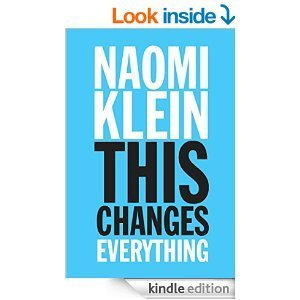 This Changes Everything: This book is a remarkable exploration of global warming from a social, economic, political, and historical perspective. The author discusses the roots of the climate crisis, what we can do about it, and a bit of her own personal experiences and realizations along the way. Her ability to weave these otherwise dry and depressing facts into a compelling story is a major part of what sells the book. The only reason that I gave it 4/5 stars is because the structure suffers a bit from this approach, jumping back and forth between topics with some repetition. For new readers who are just learning this material, though, her enthusiasm and the vital importance of this information will more than make up for the meandering nature of the narrative.
This Changes Everything: This book is a remarkable exploration of global warming from a social, economic, political, and historical perspective. The author discusses the roots of the climate crisis, what we can do about it, and a bit of her own personal experiences and realizations along the way. Her ability to weave these otherwise dry and depressing facts into a compelling story is a major part of what sells the book. The only reason that I gave it 4/5 stars is because the structure suffers a bit from this approach, jumping back and forth between topics with some repetition. For new readers who are just learning this material, though, her enthusiasm and the vital importance of this information will more than make up for the meandering nature of the narrative.
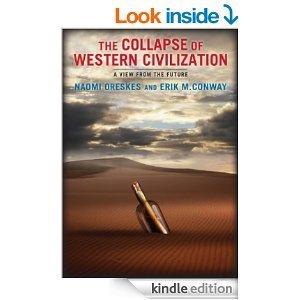 The Collapse of Western Civilization: This is an excellent and thought-provoking exploration of what the future of civilization may be like as a result of global warming. It also explores how such civilizations may view our tragic inability to avert the climate crisis. The fact that the authors incorporated extensive references to real-world events, trends, data, etc. from our time really helped this story in at least two important ways. It enhanced the illusion of this being a non-fiction text from the future and also served to highlight many important real-life facts about the climate and related issues. There are a few moments where I felt like the authors themselves were the ones doing the lecturing rather than our post-apocalyptic historian. On the whole, though, this was a remarkably prescient, relevant, and enjoyable read.
The Collapse of Western Civilization: This is an excellent and thought-provoking exploration of what the future of civilization may be like as a result of global warming. It also explores how such civilizations may view our tragic inability to avert the climate crisis. The fact that the authors incorporated extensive references to real-world events, trends, data, etc. from our time really helped this story in at least two important ways. It enhanced the illusion of this being a non-fiction text from the future and also served to highlight many important real-life facts about the climate and related issues. There are a few moments where I felt like the authors themselves were the ones doing the lecturing rather than our post-apocalyptic historian. On the whole, though, this was a remarkably prescient, relevant, and enjoyable read.
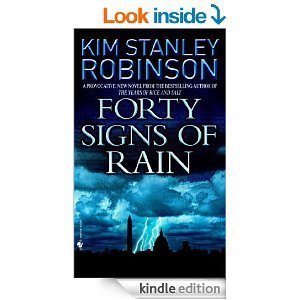 Science in the Capital Series: This three-book series is a remarkable exploration of the role of science and scientific institutions in shaping American and global policy related to climate change. It explores important concepts such as the "capture" of government agencies by private industry, the increasing push for geoengineering as a "solution" to the climate crisis, and the human costs of rising sea levels. The inclusion of Buddhist characters and themes also creates an interesting comparison and contrast between ways of thinking in scientific communities and Buddhist perspectives on knowledge and life. I love the level of detail that the characters delve into when examining scientific and philosophical questions. My two main critiques are that it (a) doesn't seem nearly critical enough of geoengineering [though this is possibly just meant to be an accurate portrayal of scientists who are convinced of its importance]; (b) seems to wrap up the major plot points in the third book almost as an afterthought. Regardless of my critiques, though, I highly recommend reading this series if you have any interest in any of its major themes: geoengineering as an alleged solution to the climate crisis; the role of scientific institutions in determining our response to climate change; and the similarities and differences between scientific perspectives and Buddhists perspectives.
Science in the Capital Series: This three-book series is a remarkable exploration of the role of science and scientific institutions in shaping American and global policy related to climate change. It explores important concepts such as the "capture" of government agencies by private industry, the increasing push for geoengineering as a "solution" to the climate crisis, and the human costs of rising sea levels. The inclusion of Buddhist characters and themes also creates an interesting comparison and contrast between ways of thinking in scientific communities and Buddhist perspectives on knowledge and life. I love the level of detail that the characters delve into when examining scientific and philosophical questions. My two main critiques are that it (a) doesn't seem nearly critical enough of geoengineering [though this is possibly just meant to be an accurate portrayal of scientists who are convinced of its importance]; (b) seems to wrap up the major plot points in the third book almost as an afterthought. Regardless of my critiques, though, I highly recommend reading this series if you have any interest in any of its major themes: geoengineering as an alleged solution to the climate crisis; the role of scientific institutions in determining our response to climate change; and the similarities and differences between scientific perspectives and Buddhists perspectives.
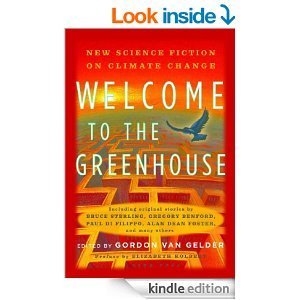 Short Story Collection: If you're interested in climate fiction (cli-fi), check out this book. As with many short story anthologies, the quality of each story and its relevance to the theme is very hit or miss. Honestly, there were times when I thought I'd give this book a lower rating. However, there are several strong stories in here that definitely should not be missed. Even the stories that fall flat as works of literature usually still raise important questions and present important visions of a world experiencing the dramatic consequences of global warming.
Short Story Collection: If you're interested in climate fiction (cli-fi), check out this book. As with many short story anthologies, the quality of each story and its relevance to the theme is very hit or miss. Honestly, there were times when I thought I'd give this book a lower rating. However, there are several strong stories in here that definitely should not be missed. Even the stories that fall flat as works of literature usually still raise important questions and present important visions of a world experiencing the dramatic consequences of global warming.
Last but not least, I'd like to give a shout-out to my own climate fiction. Since I'm the author, I'm providing a short synopsis rather than a review. I encourage you to Read, Rate, and Recommend these books. This helps more people to learn about my work and also encourages more conversation and action about climate change!
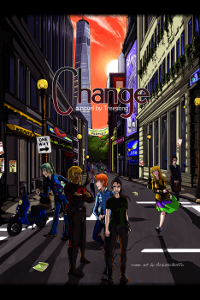 Change: Sarah Athraigh, an environmental activist from Southern Illinois, stumbles into the midst of a hidden war between occult factions that are grappling with the root causes and dire consequences of climate change. As she goes on the run, she soon finds herself on a journey of discovery, searching for the unusual allies and innovative ideas that will help her to make a difference for the better in a dangerous world.
Change: Sarah Athraigh, an environmental activist from Southern Illinois, stumbles into the midst of a hidden war between occult factions that are grappling with the root causes and dire consequences of climate change. As she goes on the run, she soon finds herself on a journey of discovery, searching for the unusual allies and innovative ideas that will help her to make a difference for the better in a dangerous world.
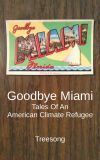 Goodbye Miami: Kass, an American climate refugee, flees Miami in the wake of a hurricane that leaves most of the city underwater. After moving in with her cousin in Southern Illinois, Kass struggles to deal with her displacement. She hopes to find a way to return to the city that she loves. But thanks to global warming, that city is now underwater. What starts as a search for survival quickly evolves into a struggle for the future of Miami -- and the world.
Goodbye Miami: Kass, an American climate refugee, flees Miami in the wake of a hurricane that leaves most of the city underwater. After moving in with her cousin in Southern Illinois, Kass struggles to deal with her displacement. She hopes to find a way to return to the city that she loves. But thanks to global warming, that city is now underwater. What starts as a search for survival quickly evolves into a struggle for the future of Miami -- and the world.
My New Patreon Page
http://www.patreon.com/treesong
September 23, 2014
Fall Harvest Sale
In other news, have you checked out my climate fiction blog? Goodbye Miami is the tale of an American climate refugee who is displaced by Hurricane Florence in the year 2030. Follow Kass's adventures by visiting the Goodbye Miami blog and liking Goodbye Miami on Facebook. Life has been quite busy lately. I have plenty of other news and thoughts to share, but I'll save that for another entry after the sale. In the meantime, I hope you enjoy Change and Goodbye Miami!
July 28, 2014
Goodbye Miami
This is the premise of Goodbye Miami.
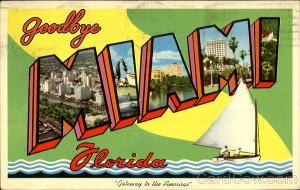 Goodbye Miami is a climate fiction blog that tells the tale of Kass, an American climate refugee who flees Miami in the wake of Hurricane Florence. Since it's the tale of a refugee, much of the story takes place outside of Miami. Wherever the main character travels, though, the story is always an exploration of the causes and consequences of climate change.
Goodbye Miami is a climate fiction blog that tells the tale of Kass, an American climate refugee who flees Miami in the wake of Hurricane Florence. Since it's the tale of a refugee, much of the story takes place outside of Miami. Wherever the main character travels, though, the story is always an exploration of the causes and consequences of climate change.I invite and encourage you to check out Goodbye Miami. For the full effect, start from the beginning and work your way forward to the "present" (today's date in 2030). If you like what you see, please share it with your friends. You can even become a supporting character in the story by posting a comment from the perspective of someone who lives in 2030. The comments are moderated, so if I like your comment, I will approve it. I can also change your username to whatever character name you like.
Thanks for your interest and support! I look forward to hearing your feedback about Goodbye Miami. In the meantime, if you enjoyed Change, have no fear. I'm still working on Order, the next book in that series. I find it very helpful to work on at least two projects at once. That way, at any given moment, I'm bound to feel motivated and inspired to write at least one of them!
Treesong on Goodreads
This blog features Treesong's occasional musings on his writing, the writing of other authors, and anything else that comes up along the way. ...more
- Treesong's profile
- 41 followers



